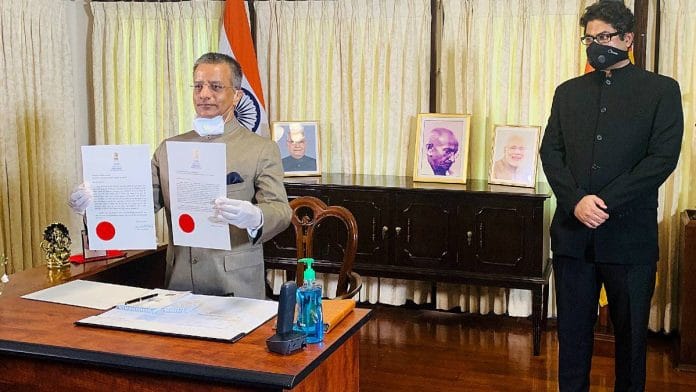New Delhi: India Thursday made a push for the “quick implementation” of the East Container Terminal (ECT) development project, which New Delhi plans to develop at Sri Lanka’s Colombo Port in collaboration with Tokyo under a $500 million deal.
The project has been stalled since 2016 owing to domestic turmoil in Sri Lanka. In May 2019, India and Japan signed a Memorandum of Cooperation (MoC) with the Sri Lankan government to develop the terminal at the Colombo Port, which is also on the map of China’s Belt and Road Initiative (BRI).
In July 2020, Sri Lankan President Gotabaya Rajapaksa ordered a review of the project ahead of elections in the country, in light of opposition concerns, and there has been no movement on it since. The project is also reportedly a matter of concern among port workers, who want ECT to be developed as a 100 per cent Sri Lankan project.
The Colombo Port project is important for India as it is seen as a counter to China’s growing penetration in the island country with BRI.
“In the present situation, at the present stage, perhaps the best way to deepen the India-Sri Lanka ties is to implement quickly the deep port project of East Container Terminal,” Gopal Baglay, High Commissioner of India to Sri Lanka said at a webinar organised by the think tanks Asean-India Centre at RIS, the Indian Council of World Affairs, the Asian Confluence, and Pathfinder Foundation.
Also Read: India hopes Pompeo’s visits to Sri Lanka, Maldives & Indonesia will reduce Chinese influence
‘New world order’
Talking of a “new world order” after the coronavirus pandemic, Baglay said it is time to deepen ties between India and Sri Lanka by implementing the pending projects.
“The most important thing that is certain about this new world order is the uncertainty. There are numerous uncertainties and numerous challenges … Nothing epitomises the uncertainties today as much as the Covid situation does,” he added.
Baglay said, “India will continue to be a reliable partner” of Sri Lanka even as he added that “time and tide do not wait for anyone” and highlighted the “imperative to implement projects quickly”.
“Time is of particular essence when we talk of the economic recovery, when we talk of the future … If we do not move with time and implement these projects, not only will these projects and their concepts become outdated and, perhaps even challenged, but sometimes these may be overtaken by events,” he said.
Ever since Prime Minister Mahinda Rajapaksa’s party registered a landslide victory in the Sri Lankan parliamentary elections this August, India has been looking at pushing a number of bilateral projects in the country, including the ECT, with the main objective of reducing China’s influence there. Bagley also talked about the “multiplicity of engagements” and highlighted the issue of maritime security.
Also Read: India keen to ‘leverage’ US focus on its neighbourhood as they stand up against China






